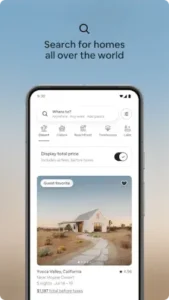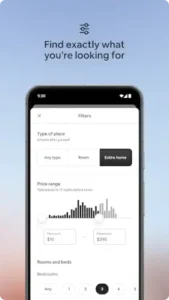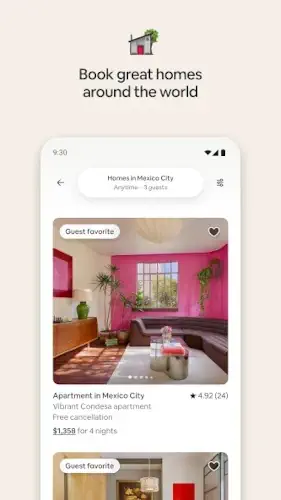The way we travel has fundamentally changed since 2008 with Airbnb.

Gone are the days when vacations meant choosing between cookie cutter hotel rooms or questionable motels. Instead, travelers now have access with Airbnb app to homes that feel lived in, neighborhoods that pulse with local life, and hosts who offer more than just a key, they provide context.
This shift didn’t happen by accident. It began with three people in San Francisco who rented out air mattresses in their apartment to offset rent. Today, that idea has grown into Airbnb, a platform valued at over $100 billion, operating in 220 countries and redefining what it means to find a place to stay.
But Airbnb isn’t just about booking a room. It’s about access. Access to treehouses in Costa Rica, houseboats in Amsterdam, or even a renovated sheep wagon in Montana. It’s about travelers who want to live like locals, even briefly, and hosts who monetize their extra space while sharing their slice of the world. The impact extends beyond convenience, it has reshaped local economies, allowing homeowners in tourist heavy areas to compete with hotels and giving visitors a reason to stay longer, spend locally, and return.
What Is Airbnb?
Airbnb started as a side hustle. In 2008, designers Brian Chesky and Joe Gebbia, struggling to pay rent, inflated three air mattresses in their living room and marketed the space as “Air Bed & Breakfast” for attendees of a sold out design conference. The idea was simple: temporary lodging with a personal touch. Fast forward 15 years, and that scrappy concept has evolved into a global marketplace offering everything from urban lofts to off-grid yurts.
At its core, Airbnb is a peer to peer platform where hosts list properties, entire homes, private rooms, or shared spaces, and guests book them for short or long term stays. Unlike traditional hospitality, Airbnb thrives on variety. A single search might reveal a Parisian artist’s loft, a Kyoto machiya townhouse, or a converted fire tower in Oregon. This diversity attracts a broad demographic:
- Solo travelers seeking affordable, social stays (shared rooms, host meetups).
- Families needing full homes with kitchens and laundry.
- Digital nomads using monthly rentals as temporary workspaces.
- Event attendees (weddings, festivals) booking group accommodations.
The platform’s success hinges on trust. Hosts and guests build reputations through reviews, verified IDs, and responsive communication, a system that has (imperfectly) replaced the standardization of hotels.
Airbnb Features That Make Airbnb Work
Search & Filters: Precision Overload
Airbnb’s search functionality is deceptively powerful. Beyond basic location and date inputs, granular filters let users narrow results by:
- Price range (with a slider for last-minute deals).
- Property type (entire place, private room, shared room, unique stays).
- Amenities (Wi-Fi, pools, pet-friendly, EV chargers, etc.).
- Trip purpose (work-ready with desks, family friendly with cribs).
The interactive map is a game changer. Instead of scrolling through endless listings, users can drag a map to explore neighborhoods, revealing prices and availability in real time, a must for travelers prioritizing walkability or specific landmarks.
Booking Tools: Flexibility vs. Certainty
- Instant Book: Like a hotel reservation; no host approval needed (ideal for time sensitive trips).
- Request to Book: Hosts manually confirm, common for unique properties or stricter rules.
Payments are processed securely, with options for credit cards, PayPal, or regional methods like Alipay. Airbnb holds funds until 24 hours after check-in, protecting both parties.
Host-Guest Dynamics: The Review Ecosystem
- Transparency: Both parties review each other post-stay, with public feedback and private notes.
- Messaging: Built-in chat for coordinating check-ins, special requests, or local tips.
- Verification: Government ID checks, social media links, and references bolster trust.
Global Reach, Localized Experience
The app supports 27+ languages and automatically displays prices in local currencies. Listings often include guides written by hosts, think hidden cafes or the best subway routes, giving guests a head start on blending in.
Design & User Experience: Why It Feels Intuitive
Airbnb’s interface avoids clutter, putting visuals first. High resolution photos dominate listings, with a swipeable gallery that highlights key spaces. The design leans on Material Design principles:
- Color: Clean white backgrounds with splashes of Airbnb’s signature coral for CTAs.
- Typography: Clear, readable fonts with responsive scaling.
- Navigation: A persistent bottom menu (Search, Saved, Trips, Messages, Profile) reduces taps.
Small touches enhance usability:
- Smart defaults: Search results prioritize highly rated listings.
- Animation: Subtle transitions (e.g., favoriting a property triggers a tiny “saved” bounce) make interactions tactile.
- Accessibility: Screen reader compatibility, high contrast mode, and adjustable text sizes cater to diverse needs.
User Reviews: The Reality Check
What Guests Love
- Uniqueness: Stays you can’t find elsewhere (e.g., castles, tiny homes).
- Value: Often cheaper than hotels for groups/long stays.
- App Reliability: Smooth booking, real-time updates, and GPS directions to properties.
Common Complaints
- Customer Service: Slow response times for refunds or disputes.
- Pricing: Cleaning fees and service charges can double listed rates.
- Inconsistency: Photos sometimes misrepresent spaces (hence the “read reviews” mantra).
Despite a 4.3+ star average on app stores, trust issues linger. A 2023 analysis showed 35% of users would “highly recommend” Airbnb, while others cited “hit or miss” experiences, proof that the human element (both hosts and support teams) remains its wild card.
How to Use Airbnb Like a Pro
Booking the perfect Airbnb isn’t luck, it’s strategy. Whether you’re a first-time user or a frequent traveler, these steps and insider tips can help you avoid common pitfalls and secure the best stays.
Step by Step Booking Process
- Define Your Needs
- Destination & Dates: Be flexible if possible. Shifting your stay by a day or two can unlock better rates.
- Group Size: Filter by bedrooms/bathrooms to ensure comfort.
- Must-Have Amenities: Prioritize essentials (e.g., Wi-Fi for remote work, laundry for long trips).
- Search Smartly
- Keyword Tricks: Use the search bar for specifics like “waterfront” or “historic district.”
- Map View: Toggle to see listings near attractions or transit hubs. Zoom in to avoid unsafe areas or tourist traps.
- Filter Like a Pro
- Superhosts Only: These hosts maintain a 4.8+ rating, 90% response rate, and low cancellations.
- Cancellation Policies: Opt for “flexible” if your plans might change.
- Price Breakdown: Enable “display total price” to see fees upfront (avoid sticker shock at checkout).
- Evaluate Listings
- Photo Red Flags: Overly wide-angle shots may hide small spaces. Look for real-life images of bathrooms and kitchens.
- Review Patterns: A host with 100+ “cleanliness” mentions is likely reliable. Recent complaints signal declining quality.
- Book with Confidence
- Message First: Ask about noise levels, parking, or early check-in. Responsive hosts are a green flag.
- Payment: Use credit cards for chargeback protection. Avoid off-platform transactions (a common scam).
Advanced Tips
- Last-Minute Deals: Message hosts 1-3 days before your trip. Unbooked listings often drop prices.
- Long-Term Discounts: Many hosts offer 10-30% off weekly/monthly stays, ask politely.
- Off-Season Gems: Target popular destinations in shoulder seasons (e.g., ski towns in summer).
Alternatives to Airbnb: When to Switch Platforms
While Airbnb dominates the vacation rental market, it’s not always the best fit. Here’s how competitors compare:
Top Contenders
| App | Best For | Where It Beats Airbnb | Drawbacks |
|---|---|---|---|
| Vrbo | Families | No shared spaces; often entire homes. | Fewer urban listings. |
| Plum Guide | Luxury travelers | Vetted “perfect” homes with premium design. | Limited inventory; pricier. |
| Booking.com | Hotel hybrids | Combines hotels/apartments in one search. | Less personal than Airbnb. |
Niche Options
- Homestay: Live with locals for cultural immersion (think cooking classes with hosts).
- OneFineStay: High-end rentals with concierge services (stocked fridges, private chefs).
- Agoda Homes: Strong in Asia; often cheaper for beach villas or ryokans.
When to Choose Them:
- For groups: Vrbo’s whole home focus avoids roommate surprises.
- For reliability: Plum Guide’s curation minimizes gamble.
- For hotels too: Booking.com’s hybrid model simplifies mixed itineraries.

Behind the Scenes: How Airbnb Works for Hosts
Host Tools
- Dynamic Pricing: Algorithms adjust rates based on demand, local events, and seasonality.
- Calendar Sync: Syncs with other platforms (like Vrbo) to prevent double bookings.
- Liability Insurance: Hosts are covered for up to $3M in property damage.
Safety Nets
- ID Checks: Guests verify identities with government IDs or social profiles.
- $3M Host Guarantee: Covers theft or damage (though exclusions apply; read the fine print).
- 24/7 Support: In theory, but response times vary widely.
Community Building
- Host Forums: Advice on pricing, guest issues, and local regulations.
- Experiences: Hosts can offer paid activities (e.g., pasta making classes), diversifying income.
Conclusion: Is Airbnb Right for You?
Best For
- Travelers who want kitchens, local vibes, or unique stays (e.g., windmills, Airstreams).
- Hosts looking to monetize extra space with relatively low overhead.
Limitations
- Fees: Service charges (14-20%) and cleaning fees can inflate costs.
- Support: Dispute resolution is notoriously slow; document everything.
- Inconsistency: Unlike hotels, quality isn’t standardized.
Rating: 4/5
Airbnb excels at choice and authenticity but requires savvy use. Pair it with alternatives like Vrbo for families or Plum Guide for luxury to cover all bases.
FAQ
Where can I download the Airbnb app?
You can get Airbnb for Android on Google Play Store.
Is there an official Airbnb website or wiki?
Yes. Visit airbnb.com to browse listings. For community driven tips, check the Airbnb Help.
How do I avoid scams on Airbnb?
- Only book through the official app/website.
- Read reviews carefully (especially recent ones).
- Avoid hosts who ask for payment outside Airbnb.
What’s the difference between Airbnb and Vrbo?
Airbnb offers shared rooms, entire homes, and unique stays, while Vrbo focuses on whole properties (better for families). Compare prices on both.
Can I negotiate prices on Airbnb?
Some hosts offer discounts for long stays (weekly/monthly) or last-minute bookings. Politely message them before reserving.
